The automotive market is teeming with options, but two names stand out in the compact SUV segment: the Lexus NX and the Mazda CX-5. Both models offer unique characteristics, compelling features, and technology that cater to different drivers' preferences. This article dives into a detailed comparison of the Lexus NX and Mazda CX-5, focusing on their technical aspects and innovations.
Lexus NX vs Mazda CX-5 - Differences and prices compared
Compare performance (309 HP vs 141 HP), boot space and price (46000 £ vs 30000 £ ) at a glance. Find out which car is the better choice for you – Lexus NX or Mazda CX-5?
Performance and Powertrains
The Lexus NX is available with two hybrid powertrains: a Full Hybrid and a Plug-In Hybrid, capable of producing 244 HP and 309 HP, respectively. With a smooth CVT automatic transmission, the NX boasts an impressive acceleration of 0-100 km/h in as little as 6.3 seconds. Considering its fuel efficiency, the NX delivers an average consumption of 5.7 L/100km.
On the other hand, the Mazda CX-5 is equipped with a range of petrol and diesel engines, offering power outputs from 150 HP to 194 HP. Although it takes longer to reach 100 km/h, with times ranging from 9.2 to 11.1 seconds, the CX-5 also showcases good fuel efficiency, with consumption figures ranging from 5.6 to 7.3 L/100km, depending on the engine choice.
Transmission and Drivetrain
Both cars provide multiple drivetrain options, with the Lexus NX available in Front-Wheel Drive (FWD) and All-Wheel Drive (AWD) configurations. Its CVT transmission allows for a seamless driving experience in various conditions.
The Mazda CX-5 offers both manual and automatic transmission options, allowing drivers to choose how they want to engage with the car. Similar to the NX, it also comes in FWD and AWD configurations, enhancing its versatility and capability on different terrains.
Dimensions and Capacity
In terms of size, the Lexus NX measures 4660 mm in length, 1865 mm in width, and 1670 mm in height, making it larger overall than the CX-5, which stands at 4575 mm long, 1845 mm wide, and 1680 mm high. This difference provides the NX with a more spacious trunk capacity of 545 L compared to the CX-5's 522 L, although both vehicles comfortably accommodate up to five passengers.
Interior Features and Technology
Both the Lexus NX and Mazda CX-5 are equipped with modern technology and infotainment systems. The NX features a premium aesthetic with high-quality materials and an intuitive display. Innovations such as a touchpad interface, advanced driver assistance systems, and a premium sound system set it apart in terms of luxury and comfort.
Conversely, the CX-5 also emphasizes driver and passenger connectivity with Mazda's infotainment system, which includes user-friendly navigation and smartphone integration. It prioritizes practical aesthetics while delivering a sporty driving experience that reflects Mazda's ethos.
Innovations and Environmental Impact
In an era where environmental sustainability is crucial, the Lexus NX shines with its hybrid technology. Both the Full Hybrid and Plug-In Hybrid versions are designed to minimize carbon emissions, boasting CO2 emissions as low as 129 g/km. This efficiency is complemented by an impressive electric range of up to 68 km, particularly beneficial for short trips.
The Mazda CX-5, while not hybrid, employs MHEV (Mild Hybrid Electric Vehicle) technology in some of its models, resulting in better efficiency and lower emissions compared to traditional petrol engines. However, its CO2 emissions range from 146 to 173 g/km, making it less environmentally friendly than the NX.
Conclusion: Choosing Your Ideal SUV
The choice between the Lexus NX and Mazda CX-5 ultimately depends on the priorities of the buyer. If you’re leaning towards luxury, hybrid efficiency, and advanced technology, the Lexus NX is a compelling choice. However, if you prefer a sporty driving experience with a practical interior at a more affordable price point, the Mazda CX-5 stands out as an excellent contender.
In conclusion, both SUVs bring unique strengths to the table, ensuring that buyers in the compact SUV market have plenty of options to consider based on their individual needs and preferences.
Here’s where it gets real: The technical differences in detail
Costs and Efficiency:
Looking at overall running costs, both models reveal some interesting differences in everyday economy.
Mazda CX-5 has a convincingly advantage in terms of price – it starts at 30000 £ , while the Lexus NX costs 46000 £ . That’s a price difference of around 16037 £.
Fuel consumption also shows a difference: Lexus NX manages with 2.90 L and is therefore decisively more efficient than the Mazda CX-5 with 7 L. The difference is about 4.10 L per 100 km.
Engine and Performance:
Power, torque and acceleration are the classic benchmarks for car enthusiasts – and here, some clear differences start to show.
When it comes to engine power, the Lexus NX has a convincingly edge – offering 309 HP compared to 141 HP. That’s roughly 168 HP more horsepower.
In acceleration from 0 to 100 km/h, the Lexus NX is convincingly quicker – completing the sprint in 6.30 s, while the Mazda CX-5 takes 10.50 s. That’s about 4.20 s faster.
In terms of top speed, the Lexus NX performs slight better – reaching 200 km/h, while the Mazda CX-5 tops out at 195 km/h. The difference is around 5 km/h.
Space and Everyday Use:
Whether family car or daily driver – which one offers more room, flexibility and comfort?
Both vehicles offer seating for 5 people.
In curb weight, Mazda CX-5 is somewhat lighter – 1629 kg compared to 1805 kg. The difference is around 176 kg.
In terms of boot space, the Mazda CX-5 offers minimal more room – 583 L compared to 545 L. That’s a difference of about 38 L.
In maximum load capacity, the Mazda CX-5 performs clearly perceptible better – up to 2019 L, which is about 583 L more than the Lexus NX.
When it comes to payload, Mazda CX-5 somewhat takes the win – 601 kg compared to 515 kg. That’s a difference of about 86 kg.
Who wins the race in the data check?
The Lexus NX is far ahead overall in the objective data comparison.
This result only shows which model scores more points on paper – not which of the two cars feels right for you.
Costs and Consumption
View detailed analysis
Engine and Performance
View detailed analysis
Dimensions and Body
View detailed analysis
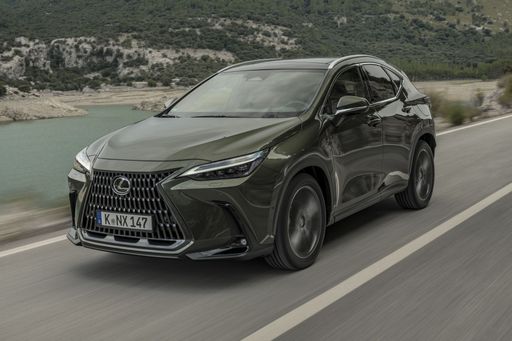
Lexus NX
Lexus NX
The Lexus NX wraps striking, chiseled styling around a cabin that feels more crafted living room than utility vehicle, with soft materials and user-friendly tech that give it genuine premium cachet. On the road it's composed and quietly confident, trading sporty pretensions for a refined, easygoing personality that will suit buyers who want luxury without fuss — with a little Lexus flair to make daily commutes feel special.
details
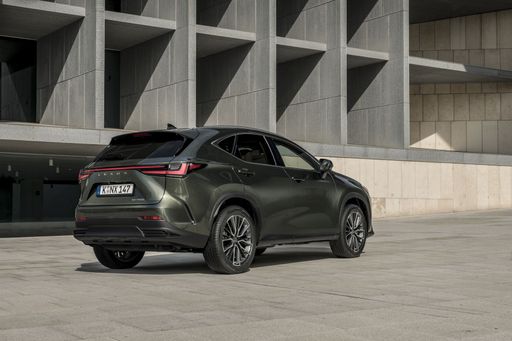
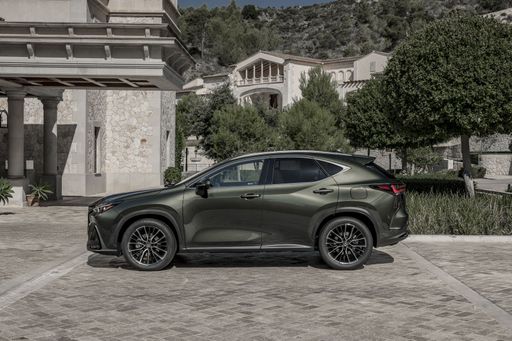
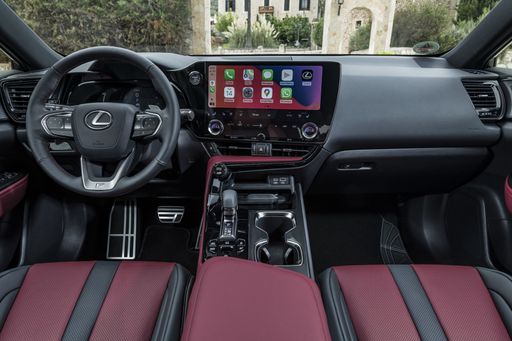
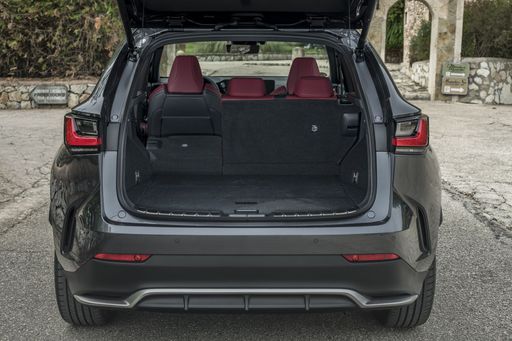
Mazda CX-5
The Mazda CX-5 blends elegant, athletic styling with a surprisingly engaging driving character, turning routine trips into small, satisfying adventures. Inside it feels thoughtfully built and comfortable, offering sensible practicality and a premium feel that punches above its price.
details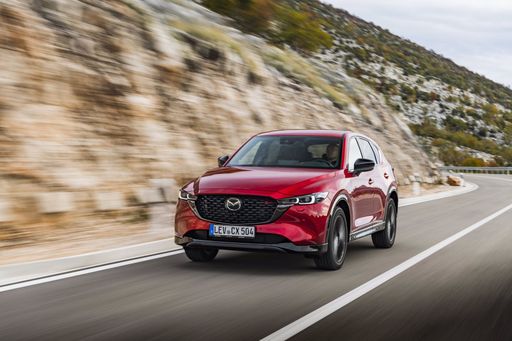
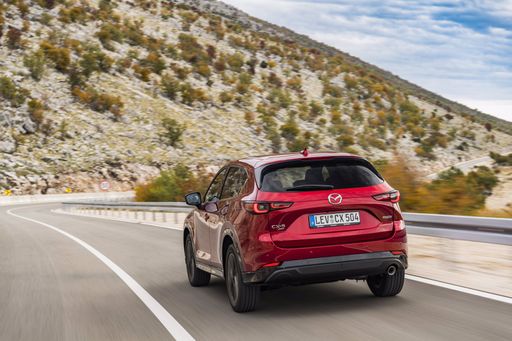
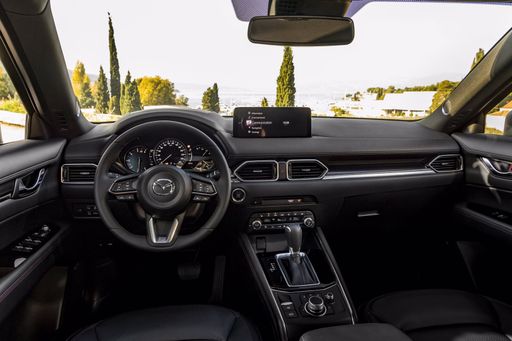
Costs and Consumption |
|
|---|---|
|
Price
46000 - 64300 £
|
Price
30000 - 39500 £
|
|
Consumption L/100km
2.9 - 5.9 L
|
Consumption L/100km
7 - 7.4 L
|
|
Consumption kWh/100km
-
|
Consumption kWh/100km
-
|
|
Electric Range
72 km
|
Electric Range
-
|
|
Battery Capacity
-
|
Battery Capacity
-
|
|
co2
65 - 134 g/km
|
co2
157 - 168 g/km
|
|
Fuel tank capacity
55 L
|
Fuel tank capacity
56 - 58 L
|
Dimensions and Body |
|
|---|---|
|
Body Type
SUV
|
Body Type
SUV
|
|
Seats
5
|
Seats
5
|
|
Doors
5
|
Doors
5
|
|
Curb weight
1805 - 2065 kg
|
Curb weight
1629 - 1671 kg
|
|
Trunk capacity
545 L
|
Trunk capacity
466 - 583 L
|
|
Length
4660 mm
|
Length
4690 mm
|
|
Width
1865 mm
|
Width
1860 mm
|
|
Height
1670 mm
|
Height
1695 mm
|
|
Max trunk capacity
1436 L
|
Max trunk capacity
2019 L
|
|
Payload
475 - 515 kg
|
Payload
601 kg
|
Engine and Performance |
|
|---|---|
|
Engine Type
Full Hybrid, Plugin Hybrid
|
Engine Type
Petrol MHEV
|
|
Transmission
Automatic
|
Transmission
Automatic
|
|
Transmission Detail
CVT
|
Transmission Detail
Automatic Gearbox
|
|
Drive Type
Front-Wheel Drive, All-Wheel Drive
|
Drive Type
Front-Wheel Drive, All-Wheel Drive
|
|
Power HP
244 - 309 HP
|
Power HP
141 HP
|
|
Acceleration 0-100km/h
6.3 - 8.7 s
|
Acceleration 0-100km/h
10.5 - 10.9 s
|
|
Max Speed
200 km/h
|
Max Speed
195 km/h
|
|
Torque
-
|
Torque
238 Nm
|
|
Number of Cylinders
4
|
Number of Cylinders
4
|
|
Power kW
179 - 227 kW
|
Power kW
104 kW
|
|
Engine capacity
2487 cm3
|
Engine capacity
2488 cm3
|
General |
|
|---|---|
|
Model Year
2025
|
Model Year
2025
|
|
CO2 Efficiency Class
D, B
|
CO2 Efficiency Class
F
|
|
Brand
Lexus
|
Brand
Mazda
|
Is the Lexus NX offered with different drivetrains?
The Lexus NX is available as Front-Wheel Drive or All-Wheel Drive.
